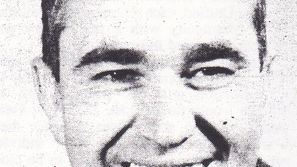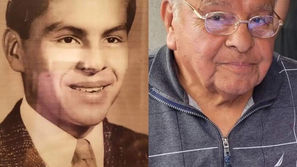8th grade research turns personal
- Bill Coate
- May 15, 2021
- 3 min read

Wendy Alexander/The Madera Tribune
Dr. Albert Wilburn meets with student historians from La Vina School who are writing the history of African Americans in Madera.
La Vina historians connect with the living past
Monday was a red-letter day for Samuel Colunga’s eighth grade class. The teenage historians left the dry, dusty archives of the Internet to focus on a living source of Madera’s African-American past.
They spent one and a half hours interviewing Dr. Albert Wilburn as part of their attempt to gather material for a book they are writing, “Madera’s Journey from Jim Crow to Civil Rights; Stories of Personal Courage.”
Standing in front of the class, Wilburn engaged the students, who sat at their desks behind plastic shields and peppered the former Stanford University football star with questions. At the back of the room, several adults (all with masks), including La Vina principal Moises Perez and teacher Samuel Colunga, joined the discussion.
The students had clearly done their homework and their questions showed it. By the same token, Dr. Wilburn was prepared, and his responses gave the students all they needed to write a biographical sketch of his life that will be placed beside other stories in the book that some have nicknamed, “The Overcomers.”
Dr. Wilburn is a 1963 graduate of Madera Union High School and the first Black student body president in the school’s history. He was a member of the renowned Madera Coyote basketball team that won the Valley championship in his senior year. He was also a football standout at Madera where his athletic exploits earned him induction into the Madera Athletic Hall of Fame in 2014.
Wilburn came to California from Clarksville, Texas, at the age of six with his mother, father, and four siblings in the winter of 1950. His father had determined to give his children every educational opportunity possible, and that meant leaving the segregated school systems of the South.
Although in those early years, Wilburn was uncertain of where life would take him, of one thing he was sure: he knew how to work. He had learned that from his parents.
After elementary school, Wilburn attended Thomas Jefferson Middle School, and it was there that he decided to become a physician. Holding fast to that goal, Wilburn gave academics everything he had.
After graduation from Madera High, Wilburn went to Stanford University as the recipient of the David Starr Jordan Scholarship, which benefited outstanding athletes who excelled academically. During the summers, he found work to help with expenses. Some of the time he worked with his father, who had by that time moved from farming to construction. At other times, he worked as an orderly at Dearborn Hospital, where his mother was employed.
While at Stanford, he played on the football team and was team captain in his senior year. As the capstone to his collegiate career in athletics, Wilburn was named the Al Masters Student Athlete of the Year for 1966-1967.
He graduated from Stanford in 1967 with a degree in biology and was accepted for medical school at UCLA. Four years later he was serving his internship.
From 1972 to 1974, Dr. Wilburn served as a physician with the National Public Health Service. This was tantamount to serving in the military with the rank of Captain. During this time, he served in a Free Clinic in Columbus, Ohio.
Subsequent to his government service, Wilburn did his residency and received a fellowship at Martin Luther King Hospital in Los Angeles County. In 1979, he opened a private practice in the Los Angeles area.
By the mid 1980s, Wilburn and his wife, Marilyn, decided to move to Fresno to be near his parents, who lived in Madera and were in need of frequent medical attention. He became a physician at the Kaiser Permanente Medical Center in Fresno and remained there until his retirement in November 2010.
Dr. Wilburn’s message to the students was clear throughout. Hard work assures one of success. He urged his young colleagues repeatedly to pay the price of success — steady, unrelenting, unyielding dedication to hard work, no matter what goal is being pursued.
The La Vina students are being joined by 8th graders in Scott Gandy’s class at Eastin-Arcola in researching and writing the story of the African-American experience in Madera.


























Comments